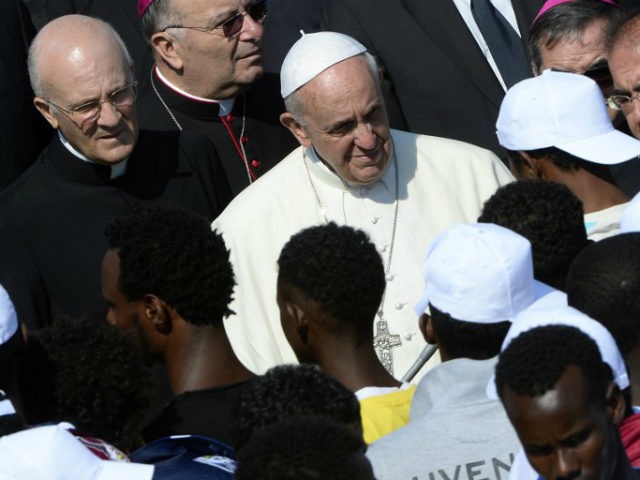The Vatican newspaper announced Monday that over 160 nations had adopted the United Nations “Global Compact for safe, orderly and regular migration” (GCM), declaring the agreement a major milestone in international immigration regulation.
“An important example of multilateralism, the GCM is the first international agreement on migration at the global level,” L’Osservatore Romano noted in its article.
The piece went on to lament the refusal of several key nations to participate, including the United States, Israel, Italy, and others.
At the moment, the full list of abstaining countries comprises the U.S., Hungary, the Czech Republic, Slovakia, Poland, Italy, Austria, Croatia, Slovenia, Bulgaria, Switzerland, Australia, and Israel, the article notes.
The L’Osservatore Romano piece insists that the agreement does not violate the sovereignty of states and merely “reaffirms respect for human rights.” It also approvingly cites German Chancellor, Angela Merkel, a proponent of the agreement, who called the deal “a big step forward in the fight against human traffickers.”
The Vatican has been an outspoken advocate of the GCM, urging nations to be more welcoming toward migrants and refugees.
Last week, the Vatican’s department for Migration and Refugees issued a statement praising the accord, saying that it stressed “greater cooperation and responsibility sharing.”
“The Holy See will join many other governments of the world to celebrate the adoption of this pact, the first international agreement on migration at the global level,” the text states.
It further notes that Pope Francis’s approach to migration, summed up in the four verbs “to accept, protect, promote and integrate,” was developed into 20 action points by the Holy See’s Migrants and Refugees Section.
“Today we are happy to note that many of the principles and measures listed in the 20 Points have been included in the final text of the Pacts, and in particular in 15 of the 23 Goals of the GCM,” the statement declares.
“The GCM is the product of two years of consultations and negotiations. It was an important example of multilateralism – the only approach that, in the opinion of many, will be able to cope with the great problems that afflict humanity,” the Vatican statement reads.
While praising the pacts in the main, the statement also expresses “reservations and comments” regarding the inclusion of references to “health services related to sexual and reproductive health (including abortion) and the LGBT agenda.”
“Despite this, we welcome the adoption of the GCM in Marrakech, and of the GCR in New York, with hope,” the text states.
Those provisions, the Vatican said, “are neither agreed language in the international community nor in line with Catholic principles.”
On December 7, Jesuit Fr. Thomas Smolich, director of Jesuit Refugee Service, said his organization “regrets” that some countries have abstained from the compact discussions and will not sign the agreements.
“It is evident to all observers that migration is a truly global phenomenon, closely interconnected with situations of inequality in the world,” Smolich said.
“Global migration brings global challenges, and requires global responses. The process that led to the migration and refugee compacts was an unprecedented attempt to look for solutions in a globally coordinated way,” he said.
While claiming he understands that countries that cite national security as a key factor behind immigration policies, “states must remember that security is not about securing borders, but about providing for the security of all people.”
Follow Thomas D. Williams on Twitter Follow @tdwilliamsrome

COMMENTS
Please let us know if you're having issues with commenting.